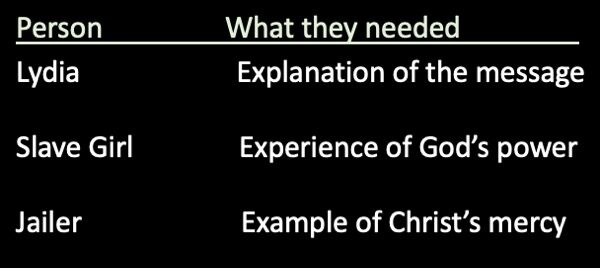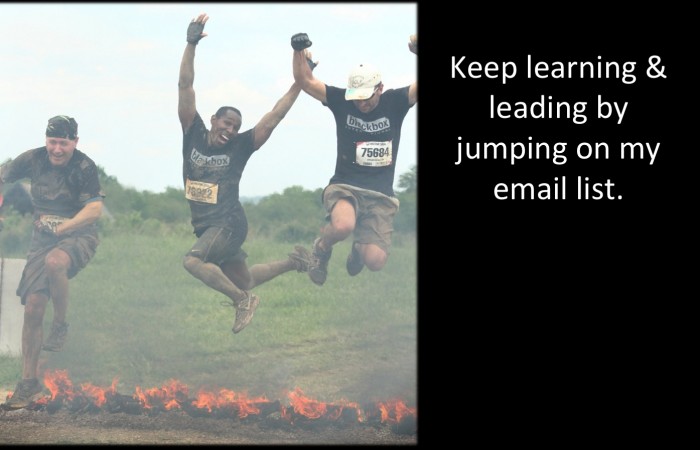3 Things Your Not-Yet-Believing Friends May Need
Written by Brian Jennings, Posted in Blog
Every person who does not yet believe in Jesus needs rescued by Him. But each individual has specific needs. Knowing these needs helps us better know how to pray and act as we partner with God in the greatest work of all – the saving of people. God doesn’t need us to partner with Him, but He invites us nonetheless.
In Acts 16, we read 3 stories: 3 different people, 3 distinct backgrounds, 3 specific needs. This text has been stirring in my heart for 4-5 months.* I pray it will inspire and equip you as well.
Story 1: Lydia (Acts 16:11-15; 40)
Lydia had wealth, prominence, and was a worshiper of God – a Gentile who believed in the God of the Jews. But she did not yet know of Jesus.
She needed to hear an Explanation of the Message.
Her response is immediate. We later read that she hosts the church in her home. Their church practiced generosity in support of Paul’s ministry.
Sometimes you’ll have the opportunity to meet someone who just needs the message explained. Everything about their heart is already lined up to respond to Jesus, and God invites you to partner in His will on Earth.
Story 2: Slave Girl (Acts 16:16-21)
This poor girl was possessed by a demon and being trafficked by slave owners. After days of annoying Paul and his companions, he expels the demon. Luke writes that two things were expelled: the demon and the slave owners’ money-making scheme.
This girl needed more than an explanation. She needed an Experience of God’s Power, a supernatural deliverance, a dramatic rescue.
Maybe that’s your friend. The Devil seeks to ruin and control us. Greed, addiction, and abusive relationships might do the trick for him. So we pray for God’s miraculous work to save people. We partner with God’s work and his power.
Story 3: Jailer (Acts 16:22-34)
When the slave owners realized their money-making scam was destroyed, chaos ensued. Paul and Silas get nabbed, stripped and beaten to a pulp. The prison held zero regard for human decency. Thrown into the locks, they would have been stretched on their bruised backs or face down in the filth of the prison floor. Paul had been terribly beaten before. This was probably the first such horrific experience for Silas.
Colossians 4:2-3 gives us an idea of what they prayed: “And pray for us, too, that God may open a door for our message, so that we may proclaim the mystery of Christ, for which I am in chains.” Their prayer is not centered on their physical rescue, but on the spiritual rescue of those far from Jesus.
The jailer was likely a former Roman soldier who landed a well-paying job. He was rough, brutal, and no stranger to violence. He did what he needed to do. He was practical. He’d seen it all…or so he thought.
If a prisoner escaped, he’d be killed. So when the earthquake hit and all the prisoners had an easy run towards freedom, he prepared to end his life before being humiliated and brutalized by his Roman bosses.
Paul yelled out for him to not harm himself. He and Silas are still there. Still there!
The one thing he’d never seen was for a brutalized victim to sacrifice his life for one of the perpetrators. What kind of people love like this? And why?
The jailer needed an Example of Christ’s mercy.
This one example of mercy changed his life. He immediately asks them to explain how he can be saved. Before the night ends, he and his whole household are baptized.
When someone who doesn’t believe sees revolutionary, sacrificial mercy, they may ask the questions that will lead them to Jesus. And you may be the person God chooses to demonstrate that mercy.

What do you need? What does your friend need? An explanation? An experience? An example? All three?
Reflect on this. Let it guide your prayers, words, and actions.
I must share two more crucial lessons from this text.
First, don’t you dare say, “I’m not Paul, so I can’t partner with God like this.” There is much to honor about Paul, but don’t overdo it. God deserves the praise.
Lydia wasn’t saved by Paul’s exquisite teaching. No, “The Lord opened her heart.” We partner with God, but He does all the heavy lifting. We can’t save anyone. That’s His job.
The slave girl noisily hounded them for many days. When Paul asked God to expel the demon, was he motivated by compassion? Obedience to the Great Commission? Love? Nope, nope, nope. He rescued her because, as the text says, “He was so annoyed.” How disappointing! It’s a reminder that God can do great work, even when our hearts are flailing around.
With the jailer’s salvation story, Paul got to play a role. However, from where did Paul learn such mercy? Paul was copying Jesus.
You, faults and all, CAN partner with God.
Lastly, never forget that God’s salvation is for ALL people.
There was a common prayer, perhaps originating from a Rabbi or a Greek philosopher. It was sometimes prayed by Jewish men as they began their day: “God, I thank you that you did not make me a woman, a slave, or a Gentile.”
Sounds familiar: a woman, a slave, a Gentile.
Very familiar: a woman (Lydia), a slave (girl), and a Gentile (jailer).
The Good News of Jesus dismantles our prejudices and our pride.
Galatians 3:28 echoes Acts 16, “There is neither Jew nor Gentile, neither slave nor free, nor is there male and female, for you are all one in Christ Jesus.”
The Kingdom of God offends some by whom it rejects, but it offends even more by whom it welcomes.
God invites us to participate in the saving of people. All people. All people groups. All cultural groups. All neighborhoods. All.
He invites you & me. Have you accepted this Divine invitation?
*I’m thankful for the studious work of Tim Keller and Martyn Lloyd Jones. I also appreciate our church Staff, and especially Peyton Miller, for helping me package these concepts in accurate, memorable ways.






This is such useful information, it speaks to me because I can always find an excuse to not share. This proves we really don’t have one.
Thank you. This study has really helped me as well.